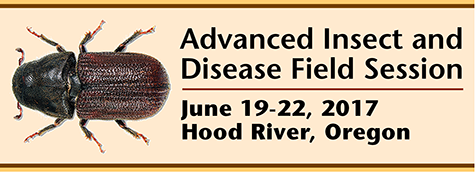Advanced Insect and Disease Field Session: Identification, Life Cycles, Control Measures and Silvicultural Regimes

Location: Departs from Hood River Inn, Hood River, OR
Monday, June 19, 2017
11:00 Field Session orientation and registration – Hood River Inn parking lot, Hood River, OR
11:30 Group departs for the field from Hood River Inn. Transportation and lunch provided.
Lunch (included with registration)
Afternoon topics:
1. Steps of diagnosis
2. Ips beetles
3. Red turpentine beetles
4. Woodborers
5. SOD and other invasive pathogens
6. Aerial survey overview
5:00 Arrive back at Hood River Inn
Tuesday, June 20, 2017
7:30 Depart from Hood River Inn
Morning Topics:
1. Overview of root diseases
2. Armillaria root disease
3. Mountain Pine Beetle
4. Thinning to prevent mt. pine beetle
5. Western spruce budworm
6. Douglas-fir tussock moth
Lunch (included with registration)
Afternoon topics and activities:
7. Indian paint fungus
8. Annosus root disease
9. Fir engraver
10. Dwarf Mistletoes
11. Group Exercise- Eastside Prescription
5:30 Arrive back at Hood River Inn
Wednesday, June 21, 2017
8:00 Depart from Hood River Inn
Morning topics:
1. Pine needle diseases
2. White pine blister rust
3. Stem decays
Lunch (included with registration)
Afternoon topics and activities:
4. Laminated Root Rot
5. Schweinitzii root and butt rot
6. Douglas-fir beetle
7. Team Exercise- Westside Prescription
5:30 Arrive back at Hood River Inn
Thursday, June 22, 2017
7:30 Depart from Hood River Inn
Morning topics and activities:
1. Team Exercise – Pruning Western White Pine
2. Larch casebearer
3. Larch needle diseases
4. Balsam woolly adelgid
5. Tree survival after fire
Lunch (included with registration)
Afternoon topics and activities:
6. Class Exercise – Identify Me!
7. Western pine beetle
8. Dwarf mistletoe recap – ponderosa pine
9. Class Exercise – Rating Dwarf mistletoe
10. Team Exercise – Dry Ponderosa pine Prescription
11. Session wrap – up
5:00 Arrive back at Hood River Inn and session adjourns.
Confirmed Speakers
- Christine Buhl, Entomologist, Oregon Dept. of Forestry, Salem, OR
- Kristen Chadwick, Pathologist, USDA Forest Service, Westside Service Center, Sandy, OR
- Darci Dickinson, Entomologist, USDA Forest Service, Wenatchee Service Center
- Melissa Fischer, Entomologist, WA State Dept. of Natural Resources, Olympia, WA
- Brennan Ferguson, Pathologist, USDA Forest Service, Wenatchee Service Center
- Holly Kearns, Pathologist, USDA Forest Service, Westside Service Center, Sandy, OR
- Mike Johnson, Entomologist, USDA Forest Service, Blue Mt. Service Center, LaGrande, OR
- Bill Schaupp, Entomologist USDA Forest Service, Central Point, OR
- Wyatt Williams, Invasive Species Specialist, Oregon Dept. of Forestry, Salem, OR
- Elizabeth Willhite, Entomologist USDA Forest Service, Westside Service Center, Sandy, OR
This field session offers the most advanced and in-depth insect and disease training available in the Pacific Northwest. The attendees will spend one-on-one field time with top-level entomologists and pathologists from the Pacific Northwest region and gain real-life experience in developing management regimes and silvicultural measures.
Each day will consist of site visits to infected stands for a first-hand look and discussion of particular insect and disease problems. Attendees will learn identification, biology, response to stand conditions and management options. Small group sessions will be used to develop management strategies and mock stand prescriptions. The region’s leading entomologists and pathologists will be on hand to provide assistance and advice as the prescriptions are developed.
Transportation and box lunches are provided daily.
Field Equipment:
The following equipment is suggested: pocket magnifier, water bottle, backpack, field book for notes, plastic sample bags, rain gear, field boots, and pocket knife. Box lunches and refreshments will be provided each day.

